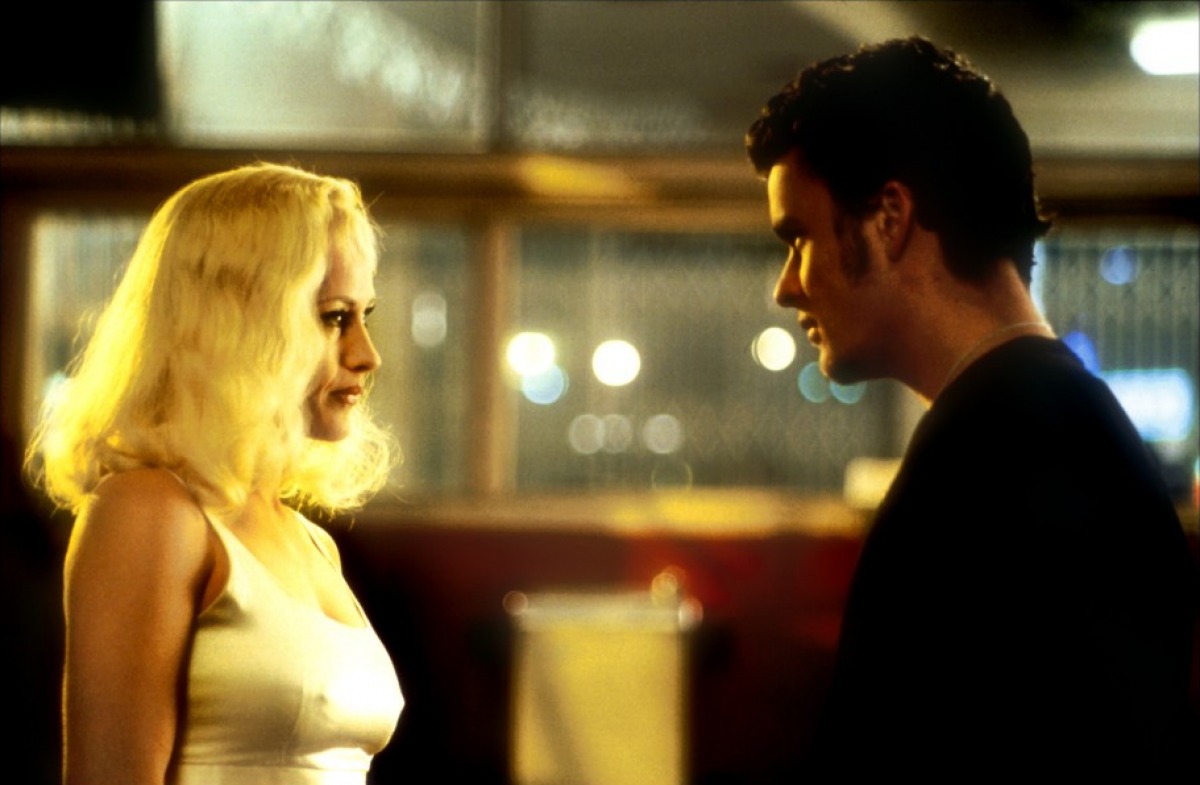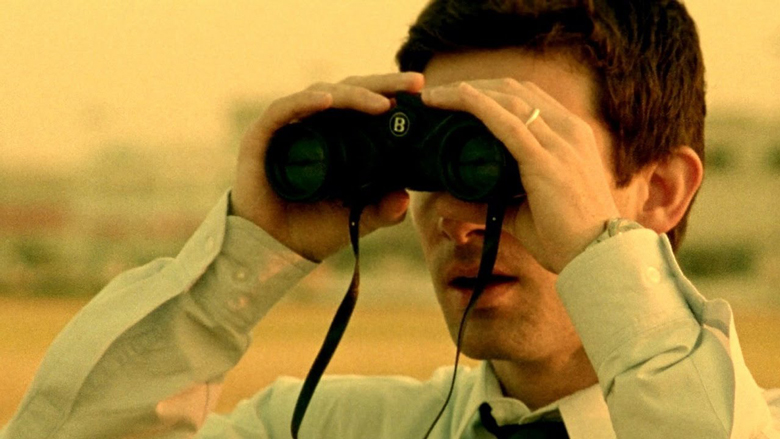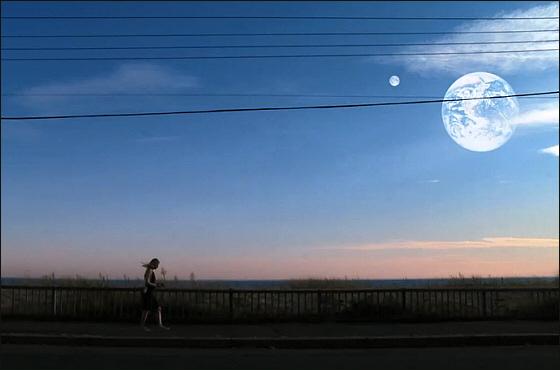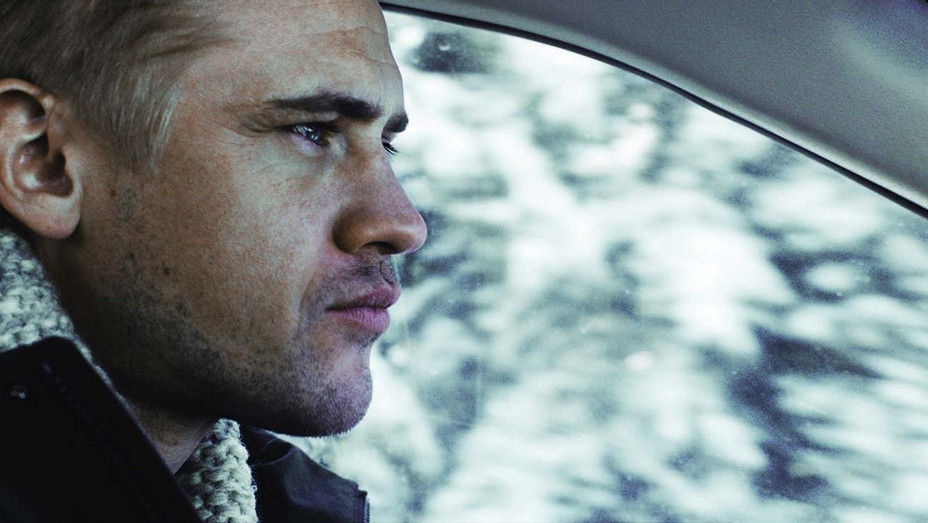6. Lost Highway (1997, David Lynch)

Much of Lynch’s filmography could be described as a study of doubles and dualities. Nevertheless, his 1997 Lost Highway takes these ideas one step further.
One can say Lost Highway is a film about a sophisticated couple tormented by a mysterious supernatural phenomenon, or about a husband’s psychological decline into depravity, or a dialogue between the dualities of light and dark, the conscious and unconscious.
It is all these things and significantly more: it is a film that one can turn over repeatedly without finding logical conclusions. This is precisely the pleasure of this film. It refuses to be understood.
Patricia Arquette portrays charming onscreen doubles Renee and Alice, who are identical in appearance save the colour of their hair and attire. Two tales are connected by these women.
In the first, Renee is bored in her marriage to saxophonist, Bill. Bill is eventually arrested for the murder of Renee, but when officers check his prison cell one morning Bill is no longer there and a teenager is sitting in his place. The second tale commences with the introduction of this teenager, whose job at a garage leads him to meet a gangster and his seductive mistress Alice.
Does Renee lead a double life? Why is the teenager in Bill’s prison cell anyway? The non-linear structure of the film assists the thematic of doubling, frequently repeating images and motifs to connect dual identities.
Mysterious and inimitable in its ambiguity, emerging as more riddle and less cinema, Lost Highway is an essential Lynch film.
7. Primer (2004, Shane Carruth)

Within the last decade, Shane Carruth’s debut film Primer has amassed an impressive cult following. Shot on a shoe-string budget of $7000 and undergoing two years of post-production, Primer is remarkably technical, precise and refuses to conform to conventional plot structures.
Set primarily within fluorescently lit garage locations, paired alongside techy sound design produced by Carruth himself, Primer observes the lives of two friends, Abe and Aaron, who have recently abandoned their day jobs to work on entrepreneurial tech projects. After the two men accidentally discover time travel during a research experiment, they resolve to only use the invention to make money on the stock market.
Beyond this pivotal moment, Primer closely examines the philosophical implications of Abe and Aaron’s discovery. Both men quickly betray their initial promise, deceiving the other to create extensive timelines, and replicating doubles of themselves which consequently come to coexist in the world alongside them. The situation becomes increasingly complex when they find themselves forced out of their personal and social lives as their doubles take control.
The film’s deliberate obscuring of plot structure imitates the complexity of time travel, the result being a disastrous conglomeration of confused identities and realities. Arguably one of cinema’s greatest cult achievements, Primer is a puzzling philosophical experiment that demands to be experienced.
8. Another Earth (2011, Mike Cahill)

Are we alone in the universe? If not, who or what else is out there? These are the questions Mike Cahill confronts in his mesmerising debut feature Another Earth.
Combining science fiction motifs with atmospheric and melancholic touches, Another Earth theorizes an earth where scientists have discovered a planet identical to earth, Earth 2. Earth 2 appears to be a mirror of earth in which all inhabitants and details are seemingly duplicated.
A young woman, Rhoda, is driving home from a house party when the radio announces that Earth 2 is now visible from earth. Leaning out of the car window to search the night sky, she crashes into an oncoming vehicle, killing a woman and her child and sending the husband into a coma.
After serving her sentence in prison, Rhoda seeks out John, the man whose wife and child she tragically killed. Rhoda begins a double life, disguising herself as a cleaner to John, who she gradually enters a misleading relationship with.
When Rhoda learns of a competition to win a ticket to Earth 2, she decides to enter, perhaps to see who she might have become if her life circumstances were different. An inevitable question arises: is life there, as life is here?
Another Earth is a sensitive portrayal of the consequences of our individual actions, and will leave audiences in deep personal contemplation as a visionary addition to the philosophy of the double in cinema.
9. Animals (2017, Greg Zgliński)

Animals is a hidden gem from experimental Polish filmmaker Greg Zgliński. Premiered in 2017 at the Berlin International Film Festival, Animals garnered short-lived acclaim in Europe after years of awaiting its on-screen arrival.
The original screenplay, which was partially inspired by an M.C. Escher painting, was written a decade before the release of Animals by the late director Jorg Kalt. Tragically taking his life later that year, the production of Animals was halted until Zgliński expanded the screenplay, dedicating the final product to Kalt.
Animals follows Austrian couple Nick and Anna, as they leave their apartment in Vienna for an extended holiday in a remote lodge in the Swiss Alps. Nick and Anna leave their apartment in the trust of Mischa, an uncanny doppelganger of Nick’s secret lover Andrea who lives in the apartment above their own, and who Anna is unaware exists.
Animals’ haunting acoustics and visual motifs of hallways and mirrors are reminiscent of the works of Polanski and Lynch, but find authenticity in their sophisticated attentiveness to detail. Working with a non-linear structure that expresses the fluidity of reality, nothing is certain in this unsettling descent into delirium. As the film’s doubling of characters, events and motifs increases so does the difficulty of separating one from the other.
Underneath the disorientation and deception an unsettling message persists: there is a duality to all. Fans of avant-garde European cinema will surely appreciate the unique vision of Animals.
10. Two/One (2019, Juan Cabral)

The most recent film on this list, Juan Cabral’s feature debut Two/One posits a surprising twist to the notion of the double.
Two/One focusses on an inherent connection between two men on opposite sides of the world, Khai and Kaden, who are oblivious to the connection they share and to the other’s existence, separated by geography and time.
The film works to demonstrate this dichotomy by splitting between scenes of Khai’s life in Shanghai, an advertising executive who masturbates to photographs of the same woman every evening on a revenge-porn site, and Kaden’s life in Vancouver, a professional ski jumper who is unwilling to accept that he is too old to continue his arduous career. When Khai wakes in Shanghai, Kaden is falling asleep in Vancouver.
As the film progresses, the temporal connection between both men is made clearer. An encounter between both men at an airport reveals that the cycle of sleep is crucial to their unique bond. When Kaden wakes, Khai suddenly falls to the floor in a state of coma. In a Kafkaesque manner, sleep and wakefulness become life-threatening activities without explanation.
Uncommercial and sensitive, Two/One witnesses moments of tender amusement and humane sympathy. It is also a film largely concerned with loneliness in the contemporary world. The film’s emphasis on doubling expresses a poetic attempt to locate connections between individuals in an increasingly isolated world.
Two/One is a beautiful, visually poetic tale of parallel worlds that unites our differences by identifying our similarities.